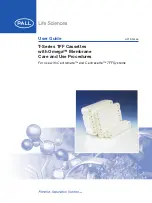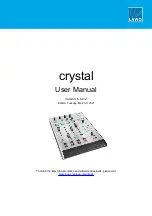
CHAPTER E GENERAL OPERATION AND DESIGN
E-1.
General
The AMPTEC RESEARCH 620ES Explosive
Safety Igniter Tester is shown in the block dia-
gram (Figure E-1). All diagrams and informa-
tion disclosed in this chapter is proprietary and
is included in order to make troubleshooting to
component level possible.
The AMPTEC 620 Series Igniter Tester uses
modern solid-state semiconductors exclusively
and digital CMOS circuits extensively to mini-
mize power requirements and make battery
operation useful and practical. AMPTEC also
maintains a spare parts inventory of all compo-
nents found in the 620ES Tester and it’s cus-
tomer service department can also provide
additional assistance in the trouble shooting
process.
E-2.
Troubleshooting
Since the 620ES Tester is used to test potential
deadly explosive force detonators and warheads
of missiles etc.,
personnel that are not qualified
to make such electrical repairs on the 620ES
Tester should not even attempt to remove the
calibration access screws or open the main
panel or effect any repair whatsoever
.
Apparent 620ES Tester malfunctions can some-
times be the result of bad test lead/connection
wiring, wrong connections, misinterpretation of
specifications, low battery levels, and in rare
cases due to an incomplete understanding of the
instrument and how to use it. A thorough review
of the operating instructions for this instrument
is recommended prior to any component
replacement. Check to be sure that cables and
other test equipment are in good working order
before attempting to troubleshoot the 620ES
series igniter tester .
If you turn on
the AMPTEC 620ES Explosive
Safety Igniter Tester
and the
display does not
come on
,
it usually means the batteries are
dead and need charging
, or fuse needs replac-
ing.
If the 620ES exhibits problems that cannot be
eliminated by reviewing Chapters B and D, the
following guidelines have been established to
help solve the problem.
E-2-1. Localizing the Problem
Chapter D-2 discusses how to use the
Functional Test Box (FTB-620ES) with the
620ES Tester to help localize the problem. The
key to successful troubleshooting is to localize
the problem to a general electronic parameter as
much as possible before trying to pin the
problem down to a specific component. Certain
questions should be asked such as "Does the
problem occur on all ranges or on a specific
range only?". If the 620ES Tester does not
come on when powered up, did you check the
rear panel fuse. The power supplies for both the
current source and the digital voltmeter
electronics are also one of the first things that
should be tested. As it is not possible to
anticipate all failure modes of the 620ES
Explosive Safety Igniter Tester, servicing
personnel should become familiar with this
section to gain a complete understanding of the
internal workings of the ohmmeter.
E-2-2. Component Replacement
If the malfunction is a faulty component, the
accuracy of the 620 Series Igniter Tester can be
maintained only if it is re-calibrated after a
component replacement and the following
precautions are taken:
Use only the specified component or its exact
equivalent. Spare parts can be ordered from
your nearest AMPTEC RESEARCH Service
Center or directly from the factory by referring
to the AMPTEC Stock Number listed in the
Parts Lists section at the back of this manual.
The highest quality 63/37 grade rosin core
electronic grade solder with a 50W or lower
maximum power soldering iron should be used.
Never use an acid core solder as corrosion of
components leads and PCB etch loss can occur.









































